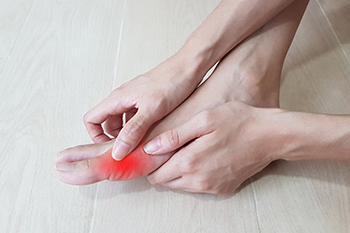 Gout, a form of arthritis caused by the buildup of uric acid crystals in the joints, affects both men and women, though it is more prevalent in men. However, women are increasingly affected, especially after menopause. Before menopause, estrogen helps to lower uric acid levels, providing a protective effect. After menopause, the decline in estrogen levels leads to higher uric acid levels, increasing the risk of gout. Women with gout often experience symptoms in different joints compared to men, with a higher likelihood of affecting the knees and wrists. Additionally, women may face a delayed diagnosis, as gout is traditionally associated with men. Understanding the gender differences in gout can lead to better awareness and treatment options for women, ensuring timely management and improved quality of life. Gout generally affects the joints and the big toe and can produce a significant amount of pain and discomfort. If you have this type of foot pain, it is strongly suggested that you visit a podiatrist who can help you to manage this condition.
Gout, a form of arthritis caused by the buildup of uric acid crystals in the joints, affects both men and women, though it is more prevalent in men. However, women are increasingly affected, especially after menopause. Before menopause, estrogen helps to lower uric acid levels, providing a protective effect. After menopause, the decline in estrogen levels leads to higher uric acid levels, increasing the risk of gout. Women with gout often experience symptoms in different joints compared to men, with a higher likelihood of affecting the knees and wrists. Additionally, women may face a delayed diagnosis, as gout is traditionally associated with men. Understanding the gender differences in gout can lead to better awareness and treatment options for women, ensuring timely management and improved quality of life. Gout generally affects the joints and the big toe and can produce a significant amount of pain and discomfort. If you have this type of foot pain, it is strongly suggested that you visit a podiatrist who can help you to manage this condition.
Gout is a foot condition that requires certain treatment and care. If you are seeking treatment, contact the podiatrists from Issaquah Foot & Ankle Specialists. Our doctors will treat your foot and ankle needs.
What Is Gout?
Gout is a type of arthritis caused by a buildup of uric acid in the bloodstream. It often develops in the foot, especially the big toe area, although it can manifest in other parts of the body as well. Gout can make walking and standing very painful and is especially common in diabetics and the obese.
People typically get gout because of a poor diet. Genetic predisposition is also a factor. The children of parents who have had gout frequently have a chance of developing it themselves.
Gout can easily be identified by redness and inflammation of the big toe and the surrounding areas of the foot. Other symptoms include extreme fatigue, joint pain, and running high fevers. Sometimes corticosteroid drugs can be prescribed to treat gout, but the best way to combat this disease is to get more exercise and eat a better diet.
If you have any questions please feel free to contact one of our offices located in Issaquah, WA . We offer the newest diagnostic and treatment technologies for all your foot and ankle needs.



